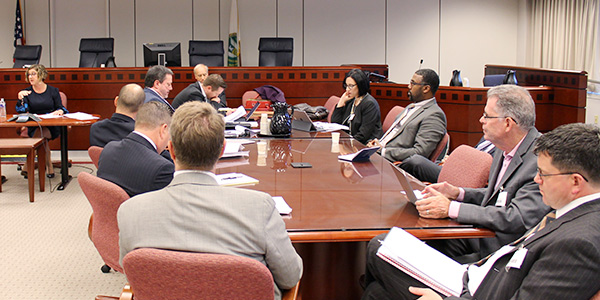By Michael Brooks
WASHINGTON — PJM’s conference to discuss its $12.5 million settlement with two financial transmission rights trading firms produced neither protest nor complaint from any of the many stakeholders who phoned in to listen Thursday.
Held in a sparsely filled hearing room at FERC headquarters, the RTO had scheduled two hours to take stakeholder questions about its settlement with Apogee Energy Trading and Boston Energy Trading and Marketing (BETM). Instead, the meeting lasted less than an hour, with a full 10 minutes taken up by stakeholders identifying themselves over the phone.
Under the settlement (ER18-2068), Apogee and BETM would receive $5 million and $7.5 million, respectively, to resolve the firms’ claims of economic harm that resulted from PJM’s decision to not liquidate GreenHat Energy’s entire FTR portfolio after the company’s 890 million MWh default. (See PJM to Pay $12.5M to Settle GreenHat Dispute.) The RTO would also establish another fund of up to $5 million for additional claimants.
The claims would be funded by members’ default allocation assessments. Apogee and BETM are also subject to the allocation, meaning they would receive their payments as credits on their assessment bills, said PJM Associate General Counsel Jen Tribulski, who led the meeting.
It was the additional fund, however, that drew the most questions from stakeholders.
Tribulski explained that if a member submits a claim and, based on PJM’s calculations, that member would have benefited had the RTO liquidated the rest of the GreenHat portfolio, then it would contribute half of its calculated benefits to the fund. Adrien Ford of Old Dominion Electric Cooperative asked if that meant the “pot” would increase over $5 million by that amount. Tribulski clarified that the fund would never exceed $5 million. Any benefiting members paying more than their default allocation assessments would simply lessen the share other members have to contribute.
Bruce Campbell, of demand-side management company CPower, asked what benefit the settlement provided to members like his, which don’t participate in the FTR market. “I don’t understand why I should be happy just as a member” about the settlement, he said.
Tribulski said that without the settlement, PJM had estimated that members would be assessed $40 million to $60 million. Had the case gone to litigation and PJM lost, the assessment could have been even larger, said Paul Flynn, an attorney with Wright & Talisman who represented the RTO in the settlement.
Comments on the settlement are due Oct. 29. If there are no comments opposing it, PJM has asked FERC to waive the 30-day reply comment period.
“I really do hope people think long and hard before filing negative comments on the settlement,” Tribulski said. “I don’t know how much better of a settlement we could have gotten or better of an outcome of this case we could have gotten. If we were to go to litigation, this will be a very long, protracted proceeding.”




